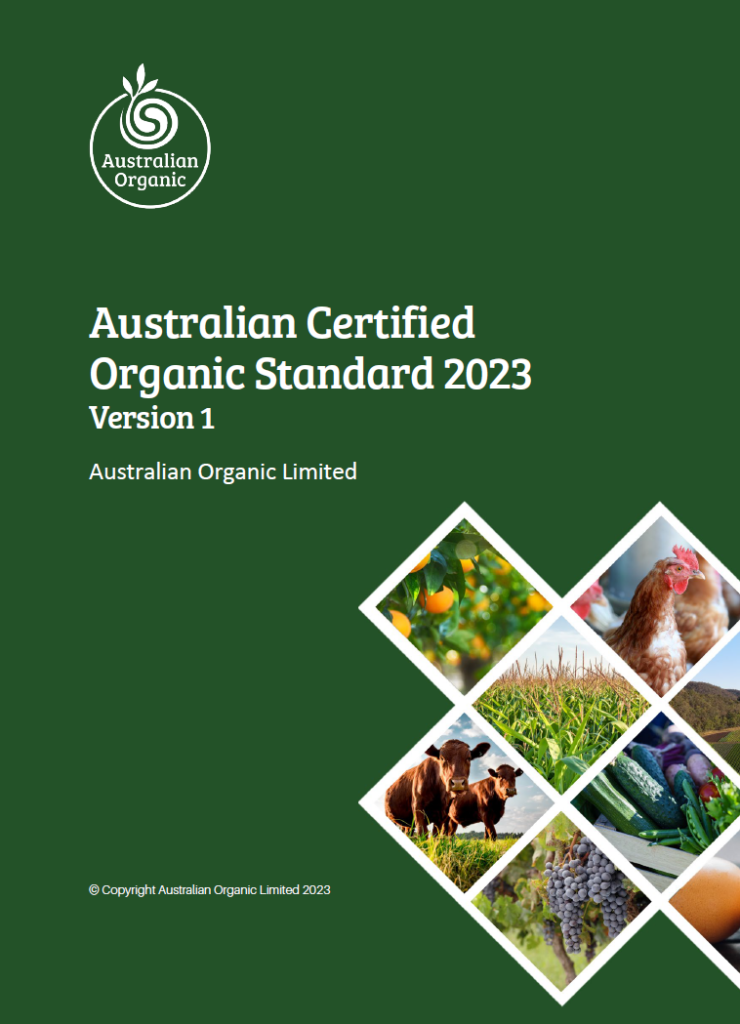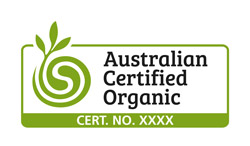
Australian Organic Limited owns and maintains the Australian Certified Organic Standard (ACOS).

The Australian Certified Organic Standard (ACOS) is aligned with the National Standard for Organic and Bio-dynamic Produce but provides more detail in some areas to make it easier for operators to ensure they are compliant. Additionally, the ACOS can provide market access to the EU for livestock and wine products.
After a thorough industry and public review, the Australian Certified Organic Standard (ACOS) 2023 has now been published. We encourage you to refer to this updated version in regards to your organic certification.
Australian Organic Limited members can access a digital edition of the ACOS 2023 in the AOL member portal.
EU organic market access for wine and livestock products was not available for Australian organic operators until the Australian Certified Organic Standard achieved equivalence for these categories.
The Government to Government equivalence agreement with the EU continues to not include these product scopes, therefore the only way to access these markets is via an EU-approved certification body, certifying according to an EU equivalent private standard.
The ACOS provides a specific Annex for the additional EU requirements, so as not to impose these requirements onto operators not wishing to export wines or livestock products to the EU.
In addition, overseas-based operators in various South East Asian and Pacific countries can achieve access to the EU market for a wide range of organic products, utilising the ACOS and the ACOS EU Annex, without the need for National Standard Certification (as the Export Control Act is only relevant within our borders).
IFOAM certification and labelling are available for operators certified by an IFOAM accredited certification body, using an IFOAM equivalent standard. The Australian Certified Organic Standard provides an Annex specifically for the additional requirements for IFOAM certification, so as not to impose additional requirements on those operators who do not require access to IFOAM labelling or IFOAM markets.
The Australian Certified Organic Standard allows for Growers Groups certification for overseas operators which are not required to be National Standard certified as they are outside of Australia. Growers Group certification allows for sampling of smallholders’ plots which are managed under an Internal Control System, a framework well agreed upon globally, however not allowed for within our National Standard.
Overall, while being fully aligned with the National Standard, the Australian Certified Organic Standard provides a level of detail and nuance that the National Standard lacks, which makes it simpler for certified operators to be sure they are compliant with both of the Standards. The ACOS is not intended to be more or less strict than the National Standard, but it is intended to provide more detail to operators, auditors, and certification bodies, to foster certainty and transparency in organic certification domestically and around the world.
As the owner of the Australian Certified Organic Standard (ACOS) and the Bud logo, Australian Organic Limited continues to uphold and maintain the highest of standards of certification through its licensed partners: ACO Certification Ltd and AUS-QUAL.
The Australian Certified Organic Standard is synonymous with the most recognised organic mark, the Bud, and recent consumer research demonstrated that 64% of Australian shoppers recognise the Australian Certified Organic Bud logo. Recognition of the Bud logo by organic shoppers is as high as 73%, a growth of over 20% in two years, and a clear demonstration of the cut-through the distinctive logo has with consumers.
Following our demerge from ACO Certification Ltd in July 2018, Australian Organic Limited has successfully founded itself as an independent peak body. As part of the process to clearly separate the two organisations’ roles, the collection and invoicing of the Industry Development Levies (IDLs) will now be managed by AOL.
Australian Organic Limited has also restructured IDL Tier Levels to be aligned with the considerable growth of the industry since last reviewed in 2014.
If you would like to request a change or make a suggestion in reference to the Australian Certified Organic Standard, please complete the appropriate submission or application form below.
Australian Organic Limited (AOL) is the peak body for the organic industry.
AOL acknowledges the Traditional Custodians of the land on which we operate, the Turrbal and Yuggera people. We extend our respect to Elders past, present and emerging.
Your download is ready, click below.